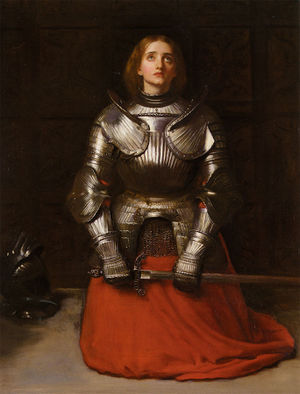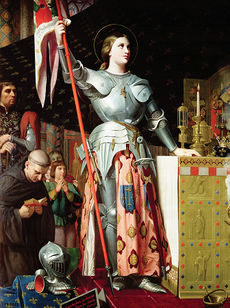Joan of Arc

Joan of Arc (c. 1412–1431), the Maid of Orléans, was God’s messenger who delivered the directions of Archangel Michael to the French army and thereby saved France.
Under the guidance of Archangel Michael, Saint Catherine and Saint Margaret—whom she called her “Voices”—Joan did what no man had been able to do. By her fervor, she galvanized her countrymen to fight for the dauphin (later King Charles VII of France) to regain the French throne. This was a decisive turning point in the Hundred Years War between Britain and France.
Joan of Arc was an embodiment of Edna Ballard, wife of Godfré Ray King, Guy Ballard, and a messenger with him.
Life
Joan of Arc was a peasant girl from Domremy, in Lorraine, at a time when parts of France were ruled by the English and their allies, the Burgundians. She was twelve when she first heard a voice speak to her. Eventually she knew the voice to be that of Saint Michael the Archangel and saw him accompanied by angels. She testified before the clerics who questioned her at her trial, “I have seen them with my corporeal eyes, as plainly as I see you.”

Saint Catherine of Alexandria and Saint Margaret also appeared and spoke to Joan. In the beginning her “Voices,” as she referred to them, told her to be a good child and go to church. When she was about sixteen they told her she had been chosen to aid the Dauphin, who had been prevented from assuming the French throne by the English in the Hundred Years War. After much heroic effort and at the insistence of her Voices, Joan succeeded in leading and winning battles against the English and in having the Dauphin crowned king of France.
At a crucial point in her career Joan went beyond what God inspired her to do and ignored the warning of her “Voices.” In 1430 she went into battle in a town she thought was key to sealing the victory she had already accomplished. However, French loyalists to Britain betrayed her. She was captured by the Burgundians and sold to the English, who put on trial for heresy and witchcraft. Among the most serious crimes for which she was mocked and condemned was her claim of receiving direct commands from God and preferring God’s commands to those of the Church. In 1431 she was burned at the stake. Twenty-five years later, she was declared innocent, and she was canonized in 1920.
Saint Joan of Arc remains the only person of either sex who has ever held supreme command of the military forces of a nation at the age of seventeen.

Her sponsorship by Archangel Michael
Archangel Michael has said of Joan of Arc:
It was the faith that was transferred to her throughout her mission that enabled her to be victorious for France and for the threefold flame that is the symbol of France—the fleur-de-lis—that fire that burns on the altar of every heart.[1]
As I stood with Joan of Arc in the campaigns against the forces of darkness, I gave her the strength and the courage and the determination to go forward when all seemed lost, when all on the side of right were ready to give up, were ready to turn back. It is then that I whispered in her ear, “Charge! Charge! Charge!”
And so she repeated the sound and the command, and the very power of my flame of faith summoned the forces of France in defense of the flame of liberty. So then, I give you that same inspiration, that same byword. When all seems wrong and all seems heavy and all seems to go to naught, that is the time to remember to charge! charge! charge with light and manifest the victory of Mighty Victory and his legions.[2]
Lessons from her life
Archangel Uriel and Aurora have spoken of the life of Joan of Arc:
Now learn from the example of the Maid of Orléans. She was within a hair’s breadth of a victorious mission when, counter to the warnings of her inner “Voices,” she attacked a town that harbored French loyalists to England. They betrayed her and allowed the English to entrap her. The French king responded to the English demands for her ransom with a mere ho-hum. He no longer had any use for this Maid of Orléans, though she had given her all for him.
Ironically, her ransom was finally paid by her enemies in the Church. But they wanted her solely for vengeance, and their devious machinations reached their denouement on May 30, 1431, when she was burned at the stake. At the last, Archangel Michael instructed her to inhale the smoke that her pain not be protracted, whereupon her soul took flight to higher realms.
Blessed ones, those were the times when people decided to wage war and win. It was clear-cut. And although Joan of Arc caused her own downfall by her failure to follow her inner guides, she did not deny her tie to them at her trial. On the contrary, she went to the stake defending her right to direct communion with God.[3]
Joan of Arc said at the stake, “I would rather die than revoke what God has made me to do.” To turn back on what God has given us to do is hypocrisy. It is cowardice. It is to recede into the shadows of the not-self.
Only love can do what Joan of Arc did and what all of the unknown soldiers and unknown patriots have done. Jesus gave the formula of that love: “For whosoever will save his life shall lose it: and whosoever will lose his life for my sake shall find it.”[4] He didn’t mean we had to die in order to give birth to liberty; he meant we had to put down the lesser self, the hungry self with the mouth constantly open, getting and getting and fattening the self. We have to relish the lean years, the surrender, the period of the fasting of the senses to give birth to a new order of the ages.
Archangel Michael says:
Some of you remember well the story of Joan of Arc. You remember the burden upon her, and you know that I was with her and led her. And you must realize that if the Maid of Orléans can come forth and lead armies, then you, precious hearts, surely can do anything—surely, in your faith in God and the conviction of his promises, you can do anything.[5]
See also
Sources
Holy Days Calendar, December 1993.
Elizabeth Clare Prophet, October 11, 1997.
Elizabeth Clare Prophet, January 2, 1993.
Elizabeth Clare Prophet, May 24, 1986.
Elizabeth Clare Prophet, May 1, 1992.
Elizabeth Clare Prophet, The Great White Brotherhood in the Culture, History and Religion of America, p. 137.
